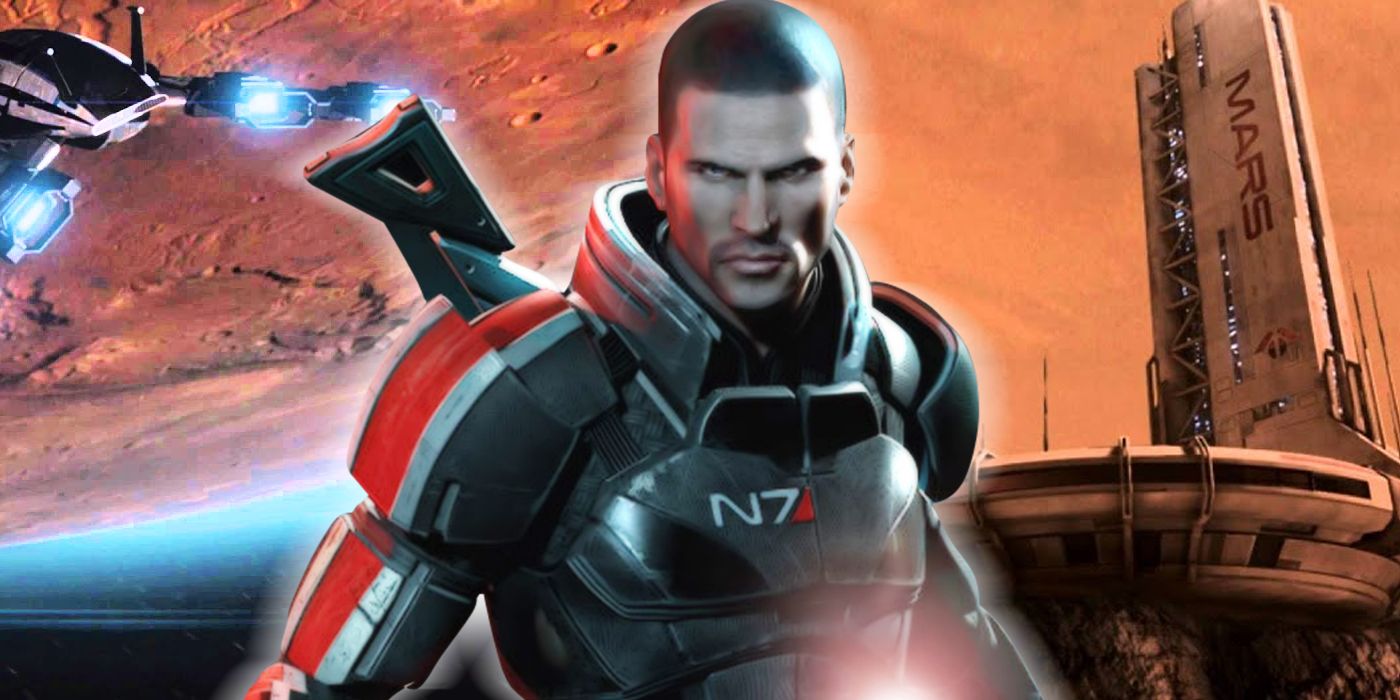
The Mass Effect games visit many exotic, alien worlds during Commander Shepard's quest to save the galaxy, from the biotic-rich Asari world of Thessia to the lush jungles of Sur'Kesh and beyond. But what about the planet Mars, one of Earth's neighbors back home in the Solar System? Well, Mars' fate is an unusual one.
For centuries, humanity placed a great deal of importance on Mars, such as the Romans seeing it as a god of war, hence its name. Early modern humans thought this world may have been home to canal-building aliens who would invade the Earth with terrifying tripod weapons of war, but in reality, Mars is a rather mundane world. In fact, by Shepard's time, it's downright forgettable.

Humanity had long since dreamed of colonizing other worlds and moons, with Mars being a prime candidate due to its proximity to Earth and relatively safe environment (though its dust and thin atmosphere were a concern). Humanity's dream was finally realized decades later in 2103, when the united Systems Alliance founded colonies on the Red Planet, establishing Lowell City as the capital (named after Percival Lowell, who was convinced that aliens lived there). The colonists soon stumbled upon an incredible secret: the Prothean archives, leftover from the bygone days of the incredible Prothean Empire.
This was humanity's first indirect encounter with alien life, and the mythical Protheans soon became a topic of great interest in the young Alliance. Mars colonists and scientists studied the archives in great detail, and in doing so, unlocked incredible technological secrets that accelerated humanity's growth. This was roughly similar to how a hidden Prothean beacon allowed the Asari to flourish on the distant Thessia.
In this way, Mars was a vital planet for the Alliance's early growth, and it could have rivaled Earth in population alongside economic and political influence at this rate. But Mars' fate was altered when humanity explored the Solar System further and found the mass relay, an even more significant find. The mass relay allowed the Alliance to quickly and easily visit other systems and clusters for exploration, mining and colonization purposes, and Mars quickly became obsolete. Of course, Mars was not entirely abandoned, and by 2183, it had over three million inhabitants. But Mars' destiny to become the ultimate space frontier was lost in the advent of mass relay technology and alien worlds, and thus Mars' growth slowed down a great deal.
By the 2180s, Mars had become just one of many human colony worlds, and Mars' only claim to fame was being home to Prothean archives that enriched humanity's technological base. Once romanticized as a god of war or the ultimate colony world, Mars soon became just another human planet, unremarkable during Shepard's time. Then the Reaper fleets arrived.

During the first two Mass Effect games, Commander Shepard rarely ever visited the Solar System, but the Commander was there when the Reaper fleets arrived in force, and the Commander narrowly fled Earth aboard the Normandy SR-2. Almost immediately, Shepard received a mission: to visit Mars and look into the Prothean archives, and see if there is any clue on how to defeat the Reapers. As a reinstated Alliance soldier, Shepard obeyed the order at once, and took a team planetside to begin the operation. Cerberus troops were there, and they had massacred everyone at the Mars research station without mercy.
Shepard and the team took the fight to Cerberus and made progress, and they even met a familiar face: Liara T'Soni, the new Shadow Broker. This came as a pleasant surprise. Liara was there for the same reason as Shepard: to find a clue on how to fight the Reapers. She found the solution, a Prothean project called the Crucible.
This was a huge find, but Cerberus wanted it too, and the robotic Dr. Eva Core swiped the Crucible plan and nearly escape with them until James Vega, a soldier new to Shepard's team, crashed his Kodiak shuttle into Dr. Core's to stop it from fleeing Mars. Once Dr. Core was subdued, Shepard reclaimed the Crucible plans, and the team hastily escaped Mars as Reaper fleets arrived.
Mars had fallen to both Cerberus and the Reapers. But, it yielded blueprints that would change the future of the entire galaxy, just the way its archives once changed the destiny of humanity a few decades earlier. The humble Red Planet wasn't yet done serving the Alliance, it seemed.
0 Comments